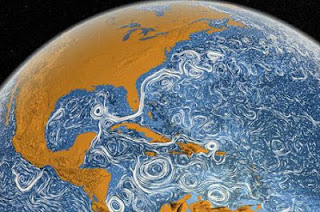![]()
“From e-finance to ecology, from peacekeeping to population dynamics, from urban planning to oceanography, from materials to medicine, and from security to sustainability, mathematics plays a central role in understanding and anticipating a wide range of planetary concerns and in predicting, manipulating or capitalizing on their consequences.”
Under this paradigm, England joined the global initiative Mathematics of Planet Earth 2013 (MPT 2013), proposed by the University of Montreal, with the support of UNESCO, which aims to show and promote the contribution of mathematics in the search for solutions to global problems such as natural disasters, climate change, sustainable development and pandemics.
At present, there are more than 100 academic institutions "partners" of MPT 2013 in various countries (and many more are expected to join), and during this year they will organize workshops, scientific congresses, public lectures, awareness-raising activities and educational activities for all ages and which also involve researchers from different fields, such as medicine, genetics or finance.
For example, Mexico will participate through various institutions, such as the Mexican Mathematical Society, UNAM and the National Polytechnic Institute. Cimat, for its part, will hold a mathematics symposium on climate change in July, a satellite event to the Mathematical Congress of the Americas (MCA), which will also be held in Guanajuato in August.
“At the other end of the ecological spectrum, [for example] oil is far from being gone, what is about to be gone is the oil that is easy to extract, the one that is at shallow depths and that you just have to dig a hole to get it out. When it stops coming out, it does not mean that there is no more oil, but that it is no longer coming out, the recovery techniques for the rest require complicated models of the dynamics of the fluids in the reservoir. How and where the pressure is increased, how the reservoir will react to the injection of surfactants (soap) or to heating it. In short…
Water and energy are problems that touch on issues ranging from social sciences to mathematics.
Predictions
“Sustainable development requires a better understanding of the complex interactions between a large number of systems: climate, economics, technological progress, geology, ecology, space science, population regulation, security, global politics and collective psychology,” explains Doyne Farmer, director of the Oxford Martin programme.
“To ensure the survival of the planet, we need a clear vision of our future and to bring philosophy into contact with science. As scientists, our job is to understand cause and effect, making predictions and quantifying as best we can the large uncertainties in those predictions. But we need mathematicians to work with physicists, ecologists, economists, etc., to be sure that we are using the right model.”
Some recent examples of the application of mathematics to solving global problems:
- Improving strategies to recharge aquifers.
- Models of how government and industry can cooperate to reduce pollution.
- Modeling the transmission of infectious diseases that has allowed the design of strategies to control or eradicate them.
- The development of theories about viruses and the drugs that have made it possible to combat them.
- Problems that mathematics is expected to help with.
- Quantifying uncertainty in climate change.
- Make more accurate predictions of natural disasters such as earthquakes, volcanoes and tsunamis.
- Adaptation of ecosystems to climate change.
- Sustainable economic models.
- Preservation of biodiversity.
By: manuel.lino@eleconomista.mx

